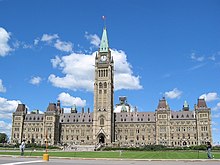Canada Elections Act
| Canada Elections Act | |
|---|---|
 |
|
| An Act respecting the election of members to the House of Commons, repealing other Acts relating to elections and making consequential amendments to other Acts | |
| Citation | S.C. 2000, c. 9 |
| Enacted by | Parliament of Canada |
| Date assented to | May 31, 2000 |
| Legislative history | |
| First reading | House: October 14, 1999 / Senate: February 29, 2000 |
| Second reading | House: February 22, 2000 / Senate: March 28, 2000 |
| Third reading | House: February 28, 2000 / Senate: May 31, 2000 |
| Committee report | House: February 22, 2000 / Senate: April 13, 2000 |
The Canada Elections Act (full title: "An Act respecting the election of members to the House of Commons, repealing other Acts relating to elections and making consequential amendments to other Acts") is an Act of the Parliament of Canada which regulates the election of members of parliament to the Canadian House of Commons.
The Canada Election Act limits spending on election advertising by interest groups, which was upheld by the Supreme Court of Canada in Harper v. Canada (Attorney General) (2004). It also sets out various provisions regarding the publication or broadcast of election advertising and election results.
In 1989, the government of Canada appointed the Royal Commission on Electoral Reform and Party Financing regarding restrictions in the Elections Act inconsistent with Section Three of the Canadian Charter of Rights and Freedoms.
In 1996, the act was amended to establish a Register of Electors.
In 2003, the act was extended to cover the nomination contests of registered parties. In 2007, it was amended to mandate fixed election dates.
In 2015 wealthy U. S.-style political action committees (PAC) organizations were introduced to Ontario and Alberta and are expected to play a major role in Canadian political elections at the provincial and federal level. PACs are new to Canadian federal politics and are "technically federal non-profit corporations" registered with Industry Canada. PACs are not subject to "campaign spending rules or limits under federal elections laws." The Canada Elections Act allows PACs to "spend up to $150,000 on third-party advertising during an election" but "spending outside the election period is unlimited." In Ontario, the union-funded Working Families Coalition, spent millions on anti-conservative ads before the 2015 Ontario provincial elections. The left-leaning organization Engage Canada, which released its first anti- Harper attack ad early June 2015.The right-leaning Conservative PAC Foundation founded by high-profile Alberta conservatives Jonathan Denis, Brad Tennant and Zoe Addington in June 2015 will fund advertising in support of Conservative Prime Minister Stephen Harper.
...
Wikipedia
